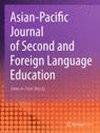从积极心理学的角度看,通过社交媒体进行任务支持的语言教学对学术投入、情绪调节、交流意愿和学术幸福感的影响
IF 2.2
Q2 EDUCATION & EDUCATIONAL RESEARCH
Asian-Pacific Journal of Second and Foreign Language Education
Pub Date : 2023-10-17
DOI:10.1186/s40862-023-00220-6
引用次数: 0
摘要
虽然任务型教学已经成为许多研究的主题,但没有研究涉及通过社交媒体(SM),特别是Telegram应用程序进行任务型教学对学术参与、情绪调节、沟通意愿(WTC)和学术幸福感的影响。为了达到这一目标,我们采用了一种方便的抽样方法,根据83名伊朗中级英语学习者的牛津快速分班考试成绩,从他们中选择了58名。所选学习者随机分为对照组(CG)和实验组(EG)。对两组的学业投入、情绪调节、WTC和学业幸福感进行了前测。在治疗期间,EG接受了使用Telegram应用程序和LMS的治疗,而CG只使用LMS,没有任何社交媒体帮助。治疗后进行后测,评价两组的表现。数据分析结果显示,EG和CG的后测分数有显著差异。EG显示了更好的结果(p <0.05)关于学术投入、情绪调节、WTC和学术幸福感,表明将Telegram与LMS结合在一起的有效性。因此,本研究表明,将Telegram应用程序与LMS结合使用可以显著提高英语学习者的WTC、学术参与、幸福感和情绪调节能力。研究结果表明,英语学生可以利用Telegram应用程序在传统课堂环境之外提高他们的英语语言技能。此外,使用像Telegram这样的社交媒体平台可以促进自学,转变学生的角色。它为英语学习者提供了方便快捷的全球信息获取途径。本研究总结了启示、局限性和对未来研究的建议。本文章由计算机程序翻译,如有差异,请以英文原文为准。
The consequences of task-supported language teaching via social media on academic engagement, emotion regulation, willingness to communicate, and academic well-being from the lens of positive psychology
Abstract Although TBLT has been the subject of many prior studies, no research has addressed the impact of TBLT through social media (SM), specifically the Telegram app, on academic engagement, emotion regulation, willingness to communicate (WTC), and academic well-being. To reach this goal, a convenience sampling method was used to select 58 Iranian intermediate EFL learners out of 83 based on their Oxford Quick Placement Test performance. The selected learners were randomly assigned to the control group (CG) and experimental group (EG). Pretests were conducted to measure both groups’ academic engagement, emotion regulation, WTC, and academic well-being. During the treatment, the EG received treatment using the Telegram app and the LMS, while the CG only utilized the LMS without any social media assistance. After the treatment, posttests were administered to evaluate the performance of both groups. The results of the data analysis revealed a significant difference in the posttest scores of the EG and CG. The EG demonstrated superior outcomes ( p < 0.05) regarding academic engagement, emotion regulation, WTC, and academic well-being, indicating the effectiveness of incorporating Telegram alongside the LMS. Thus, this study demonstrated that utilizing the Telegram app with an LMS can significantly enhance EFL learners’ WTC, academic engagement, well-being, and emotion regulation. The findings suggest that EFL students can utilize the Telegram app to improve their English language skills outside of traditional classroom settings. Furthermore, using social media platforms like Telegram can facilitate self-study and transform the role of students. It provides EFL students with easy and rapid access to global information. The study concludes with implications, limitations, and suggestions for future research.
求助全文
通过发布文献求助,成功后即可免费获取论文全文。
去求助
来源期刊

Asian-Pacific Journal of Second and Foreign Language Education
Arts and Humanities-Language and Linguistics
CiteScore
2.90
自引率
5.60%
发文量
40
审稿时长
5 weeks
 求助内容:
求助内容: 应助结果提醒方式:
应助结果提醒方式:


